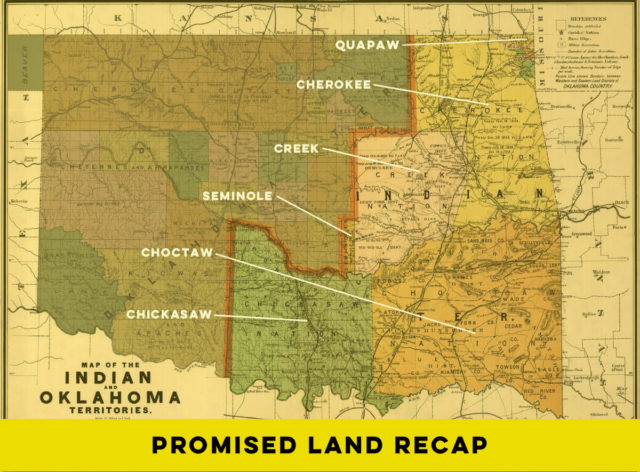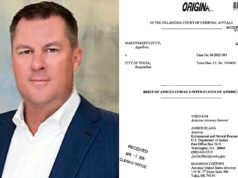

With the abundance of news following the July 2020 ruling in McGirt v. Oklahoma, it can be difficult to pin down the impact and potential implications of the landmark Supreme Court decision.
Follow NonDoc’s Promised Land coverage and related coverage from collaborators within the Oklahoma Media Center to learn more about tribal affairs and ongoing negotiations and court battles related to reservations.
This Promised Land recap features excerpts from a handful of articles in recent weeks related to the Indian County reservations in eastern Oklahoma. In addition, the following links highlight the Muscogee National Council races to be decided in Saturday’s general election:
- ‘For the future’: James Jennings challenged by Nelson Harjo Sr. in Muscogee Council runoff
- Sandra Golden wants her seat back, Travis Scott calls allegations ‘politically driven’
- For Muscogee Tulsa district, Leonard Gouge challenges Lucian Tiger III
Ida’s Law: The promise, limitations of Oklahoma’s pursuit of justice for Indigenous people
By Rebecca Najera and Whitney Bryan
Oklahoma Watch
Nov. 4, 2021
The day she realized her daughter was missing, Ida Beard’s mother went to the police.
It isn’t a crime for someone to leave town if they want to, officers said. Maybe she’ll come back, she was told.
She never did.
According to family members, they reported her missing in late June of 2015, but the El Reno Police did not open an investigation and start searching for Beard, a citizen of the Cheyenne and Arapaho tribes, until two weeks later. According to El Reno Police, her case was opened on July 15. During that two-week window, family members started asking friends and neighbors if they had seen Beard.
A new law that goes into effect this week aims to give the state’s Native American families like Beard’s a more coordinated pursuit of justice.
Ida’s Law, named for the mother of four who was 29 years old when she went missing, prompted changes within the state’s top law enforcement agency. An agent now tracks and investigates cases of missing and murdered indigenous Oklahomans. A victim advocate now supports their families.
Read more about the history and implementation of Ida’s Law.
State says income tax exemption for tribal citizens on reservations inapplicable despite ‘existing law’
By Joe Tomlinson
NonDoc Media
Nov. 3, 2021
Since the July 2020 U.S. Supreme Court ruling in McGirt v. Oklahoma, more than 5,000 people have filed official challenges of their state income tax obligations by citing a section of state code that says tribal citizens are exempt from income tax if they live and work on their tribe’s Indian Country reservation.
None of the tax protests have been approved, according to Oklahoma Tax Commission officials, despite the fact that the exemption is explicitly established under Oklahoma Administrative Code and in a 1993 U.S. Supreme Court case.
The situation underscores the ongoing attempts by Oklahoma Gov. Kevin Stitt’s administration to restrain the McGirt decision’s impact to criminal jurisdiction only and not civil jurisdiction.
“The scope of the McGirt decision is expressly limited to federal major crimes,” said Ryan Leonard, Stitt’s special counsel on tribal jurisdiction issues. “The state will continue to exercise its rightful jurisdiction within the McGirt-affected areas, including to collect taxes, which provide critical services that benefit all Oklahomans.”
Among others, tax attorneys representing tribal citizens and Cherokee Nation Principal Chief Chuck Hoskin Jr. disagree.
McGirt decision spurs fierce debate on Oklahoma tax issues
By Carmen Forman and Molly Young
The Oklahoman
Nov. 7, 2021
More than a year after the U.S. Supreme Court’s landmark McGirt decision that determined the Muscogee Nation reservation was never disestablished, the possibility that thousands more tribal citizens in Oklahoma could be exempt from income and sales taxes if the decision is expanded to civil matters has become a major point of contention.
Some tribal leaders and legal experts point to a 2020 report issued by the Tax Commission as confirmation that the McGirt decision already halts the state’s power to tax tribal citizens living and working within the boundaries of the reaffirmed reservations. Gov. Kevin Stitt, a member of the Cherokee Nation, has insisted that’s wrong.
Choctaw Nation Chief Gary Batton has said the Oklahoma Tax Commission acknowledged it no longer has jurisdiction and issued refunds to some tribal citizens. The commission says neither claim is true.
Ryan Leonard, the governor’s top lawyer on McGirt issues, has said the state is facing 5,000 tax protests and exemption requests since the Supreme Court ruling. Requests for tax exemptions have increased, but it’s unclear how many were filed by tribal citizens who were always eligible for tax waivers. Only 100 requests have advanced to the formal protest phase.
Neil Gorsuch wrote McGirt decision. Will Justice Amy Coney Barrett help overturn it?
By Chris Casteel
The Oklahoman
Nov. 1, 2021
Less than two weeks after taking office in 2017, former President Donald Trump nominated Neil Gorsuch to the U.S. Supreme Court.
Gorsuch, then a judge on the 10th U.S. Circuit Court of Appeals, had “significantly more experience with Indian law cases than any other recent Supreme Court nominee,” according to a letter written by a Native American Rights Fund attorney not long after the nomination.
Last year, Gorsuch authored a decision now considered one of the most significant in the court’s history regarding Native American issues: McGirt v Oklahoma, which has reshaped criminal jurisdiction in eastern Oklahoma with its ruling that the Muscogee (Creek) reservation was never officially disestablished by Congress.
It was a 5-4 decision and a clear example of the impact one justice can have. Gorsuch had recused himself in 2018 from a case presenting the same question about the Muscogee reservation, and the court apparently deadlocked, prompting justices to take up the McGirt case.
Now, Oklahoma Gov. Kevin Stitt and Attorney General John O’Connor are hoping that Trump’s third pick to the court, Justice Amy Coney Barrett, who replaced the late Ruth Bader Ginsburg, will contribute to a different result on the same question.
Cherokee Nation files brief with U.S. Supreme Court as Oklahoma continues to fight McGirt ruling
By Kaylee Douglas
KFOR
Oct. 29, 2021
The Cherokee Nation has filed an amicus brief with the U.S. Supreme Court on the state of Oklahoma’s efforts to reverse last year’s McGirt v. Oklahoma decision.
The U.S. Supreme Court ruled on July 9, 2020, that Oklahoma prosecutors lack authority to pursue criminal cases against American Indian defendants in parts of Eastern Oklahoma that include most of Tulsa, the state’s second-largest city.
The high court decided that the Muscogee reservation was never disestablished.
Tribal nations have worked to take over hundreds of cases impacted by the decision since that ruling.
Attorney General John O’Connor filed a petition with the U.S. Supreme Court on Aug. 6, 2021, asking the court to overturn the 2020 McGirt ruling, and narrow any application of the decision.
Now, the Cherokee Nation says it will defend the McGirt ruling from the state.
Tribal councilors square off during meeting over McGirt fallout
By Grant D. Crawford
Tahlequah Daily Press
Oct. 28, 2021
A Cherokee Nation Tribal Council Rules Committee turned contentious Oct. 28, when a discussion over the state’s attempt to overturn the McGirt decision culminated in a threat to have marshals remove one of the councilors.
The cities of Tulsa and Owasso, as well as the states of Texas, Kansas, Louisiana and Nebraska, all recently joined Oklahoma and Gov. Kevin Stitt in the campaign to overturn the landmark McGirt ruling. CN Attorney General Sara Hill said those who have signed on in support of the lawsuit are trying to make Oklahomans afraid that tribal prosecutors, tribal victim advocates and tribal police don’t care about victims and that tribal courts cannot protect the public.
To make these arguments, Hill said the governmental bodies point to the case of Tyler Tait, a Cherokee Nation Health Services physician who was arrested earlier this month and charged with the murder of Moria Kinsey, a former CNHS employee. Tait had previously been charged with domestic assault and battery before the case was dismissed in April in light of the McGirt decision. The case was then sent to federal prosecutors, who referred it to the tribe.
“For the Tait case, the state-supporting amicus briefs make the same argument that Stitt has recently made … that if the Cherokee Nation had only prosecuted the case earlier, this person may not have been free to commit murder,” Hill said. “The city neglects to mention, as Stitt also always neglects to mention, that Tait had been released on bond the same day of his initial misdemeanor domestic assault and battery offense in December of 2020.”
‘Blindsided’: Greater Tulsa Indian Affairs Commission reacts to Tulsa, Owasso support of overturning ‘McGirt v. Oklahoma’ decision
By Allison Herrera
KOSU
Oct. 28, 2021
The friend-of-the-court, or amicus, briefs were filed in the United States Supreme Court by law enforcement agencies, business groups, four states and two cities, Tulsa and Owasso, in support of Oklahoma’s petition to overturn McGirt v. Oklahoma, the landmark ruling that affirmed the tribal reservation status of much of eastern Oklahoma.
The state is arguing to the nation’s highest court that they have concurrent jurisdiction in cases where a non-Indian commits a crime against Indians on reservation land. The tribes don’t agree.
Earlier this month, Chickasaw Nation filed three briefs opposing Oklahoma’s petitions to overturn the McGirt ruling. Muscogee Nation also filed a brief opposing the state’s position, saying the ruling that affirmed the tribe’s reservation status has not plunged the state into chaos, as Gov. Kevin Stitt has asserted.
The filings by Tulsa and Owasso blindsided Joe Deere. He’s a Cherokee Nation Tribal Council member, and his district includes parts of both cities. He’s also a part of the Greater Tulsa Indian Affairs Commission.
Before this, Deere said he’s had a good relationship with both city leaders.
Court affirms existence of Quapaw Nation Reservation
By David Bartle
NonDoc Media
Oct. 22, 2021
In deciding Oklahoma v. Lawhorn on Oct. 21, the Oklahoma Court of Criminal Appeals upheld a November 2020 Ottawa County District Court ruling that the Quapaw Nation’s reservation was never disestablished. The 4-0 decision extended the landmark U.S. Supreme Court case McGirt v. Oklahoma beyond the Five Tribes, making the Quapaw reservation the sixth affirmed reservation in Oklahoma.
“The Lawhorn decision rightfully affirms what we have always known — The Quapaw Nation is Indian Country,” Quapaw Nation Chairman Joseph Tali Byrd said in a statement. “Our reservation still exists, and our sovereign rights are what we have always known them to be.”
An Ottawa County District Court judge held that since Cherokee Nation citizen Jeremy Lawhorn allegedly committed an act of lewd and indecent exposure with a child under 16 on Quapaw Nation land, the state lacked jurisdiction to prosecute him.
“Lawhorn is an Indian for purposes of federal criminal law and that the crime occurred in Indian Country, namely within the historic boundaries of the Quapaw Nation reservation,” Presiding Judge Scott Rowland wrote in the decision. “The district court granted Lawhorn’s motion to dismiss, quashed the information, and dismissed the case for lack of jurisdiction.”
Judges Robert Hudson, Gary Lumpkin and David Lewis wrote three separate concurring opinions.
Read more about the appellate court ruling which made Quapaw Nation the sixth affirmed reservation.




















